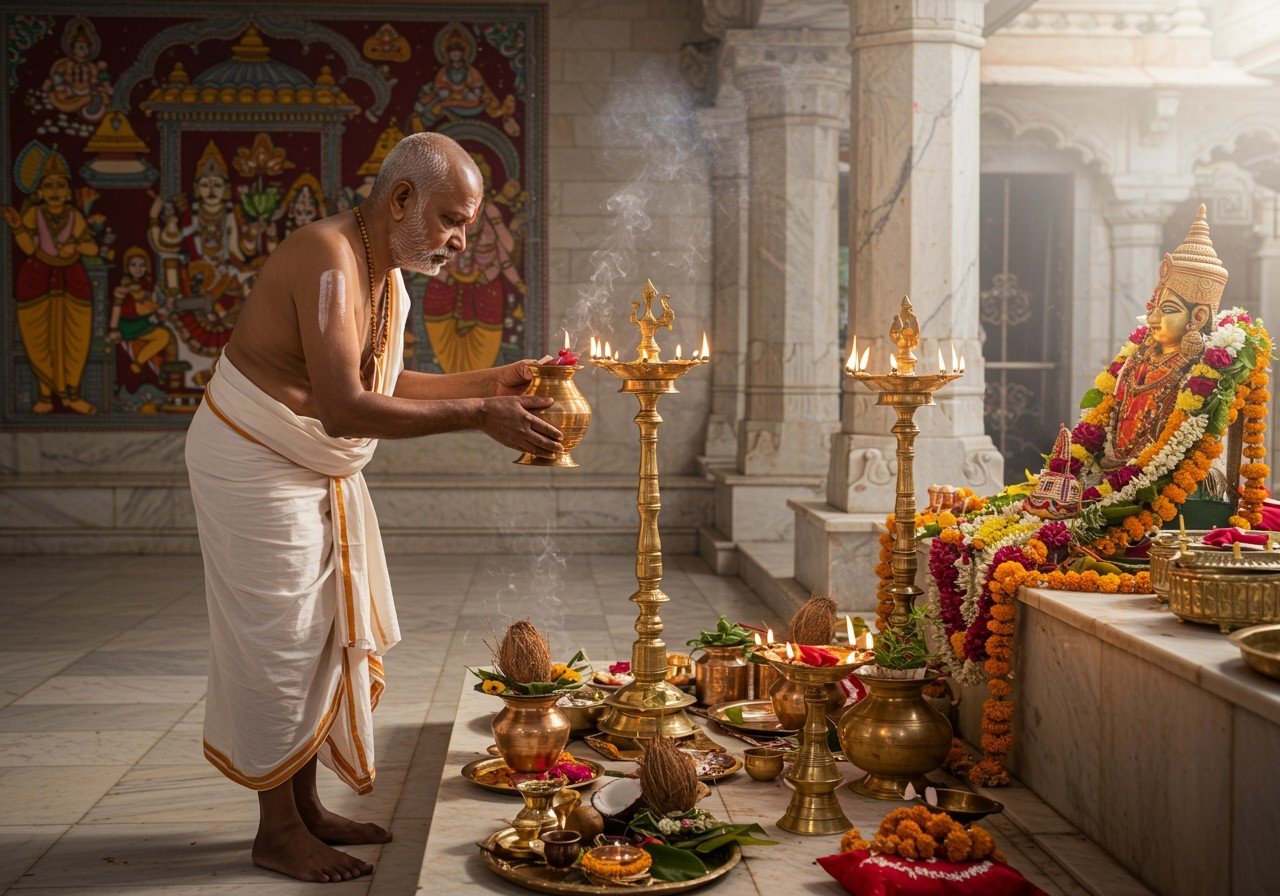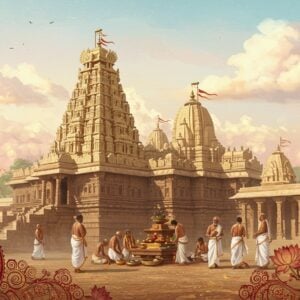
In the vibrant tapestry of Hindu traditions, the Pandit, also known as a Pujari or Bhatt, holds a position of deep respect. They are the keepers of our sacred ceremonies, guiding us through rituals that connect us to the divine. Their presence ensures that these ceremonies are performed with authenticity and reverence, keeping our cultural heritage alive.
A Pandit’s role extends beyond simply conducting rituals. They are scholars of sacred texts like the Vedas and Upanishads, possessing a profound understanding of our spiritual heritage. They offer guidance, blessings, and a deeper connection to our faith. In today’s world, the accessibility of puja samagri online through platforms like poojn.in adds a layer of convenience for modern devotees, harmoniously blending tradition with contemporary needs.
Delving into the Daily Life of a Pandit
A Pandit’s day is steeped in spiritual practice and service to the community. Their dedication and commitment are evident in their daily rituals and responsibilities:
- Daily Prayers (Puja): Pandits begin their day with prayers, often performing multiple pujas at the local temple, creating a sacred atmosphere for devotees.
- Abhishekam: This important morning ritual involves bathing the deity’s idol with reverence, adorning it with traditional garments and jewelry, signifying a fresh start to the day. It is a beautiful act of devotion and care.
- Deity Veneration: Throughout the day, Pandits perform pujas and aartis, honoring the deities with offerings and prayers, particularly around sunrise and sunset.
- Serving Devotees: Pandits are always available to bless devotees, perform short pujas, consecrate offerings, and distribute prasadam, fostering a sense of connection within the community.
- Chanting Mantras: The rhythmic chanting of mantras fills the air, creating a spiritually charged environment, invoking peace and blessings. This practice is central to many rituals.
- Blessing Devotees: Offering prasadam (consecrated food), charanamritam (holy water), and applying tilakam (sandalwood paste) are ways Pandits bless devotees, sharing the divine grace.
Beyond Daily Rituals: Other Sacred Ceremonies
Pandits also play an essential role in various other ceremonies and rituals that mark significant life events and occasions:
- Festivals: Festivals are vibrant celebrations of our faith, and Pandits guide us through the rituals that make them special, preserving the essence of each festival.
- Life Cycle Rituals: From weddings and sacred thread ceremonies to funerals, Pandits officiate these important milestones, ensuring they are performed with tradition and respect.
- Special Occasions: Housewarmings (Griha Pravesh puja) and baby showers are just a few examples of special occasions where Pandits perform rituals to invoke blessings and good fortune.
- Temple Consecration: Pandits perform Kumbhabhishekams, the elaborate rituals for consecrating new temples or re-consecrating existing ones, imbuing them with sacred energy.
- Vedic Rituals: Certain Vedic rituals require specialized knowledge, and Pandits trained in these ancient traditions ensure these ceremonies are performed with the utmost precision.
The Path of a Pandit: Training and Knowledge
Becoming a Pandit is a journey of lifelong learning and spiritual discipline. It involves rigorous training and a deep immersion in sacred knowledge:
- Vedic Study: The study of Vedas, Dharmashastras, law, grammar, and puja mantras forms the foundation of a Pandit’s knowledge, often gleaned from the Puranas. This deep study provides the foundation for their spiritual guidance.
- Guru Guidance: Under the tutelage of a Guru, aspiring Pandits learn the intricacies of rituals, the proper pronunciation of mantras, and the significance of each ceremony. This guidance is essential for their development.
- Scriptural Knowledge: Pandits possess a deep understanding of religious literature like the Bhagavad Gita and the Ramayana, which allows them to offer meaningful interpretations and inspire devotion in others.
A Life of Purity and Discipline
A Pandit’s lifestyle reflects their commitment to purity and spiritual discipline. They adhere to certain practices that maintain their connection to the divine:
- Purity: Maintaining ritual purity through regular bathing, wearing clean attire, and adhering to a vegetarian diet is an integral part of a Pandit’s life.
- Abstinence: Abstaining from meat and alcohol is a common practice, as these are considered ritually impure.
- Daily Routine: Waking up before sunrise for Sandhyavandanam (prayers) and other daily duties is a testament to their dedication.
Poojn.in: Your Partner in Rituals
At poojn.in, we understand the importance of having the right samagri for your pujas and ceremonies. We offer a wide range of authentic products, carefully curated to meet the needs of both Pandits and devotees.
Explore Our Collection:
- Kumkum and Roli: Essential for every puja.
- Hawan Samagri: High-quality ingredients for your havan rituals.
- Puja Thalis and Accessories: Beautiful and traditionally crafted.
- Saraswati Puja Kits: Everything you need for this important festival.
Visit us at poojn.in or call us at 03369029784. You can also WhatsApp us at 9476142738. We offer free shipping on orders above ₹999. Our store is located in Boardangi, East Belbari, Gangarampur, South Dinajpur.
Connecting with Tradition in the Modern Age
In today’s fast-paced world, we strive to maintain our connection to our spiritual roots. The role of the Pandit remains as vital as ever, guiding us through rituals that offer solace, blessings, and a sense of belonging. With the convenience of online platforms like poojn.in, we can easily access the necessary items for our pujas, making it simpler to honor our traditions.
Read more about Hindu rituals and traditions:


